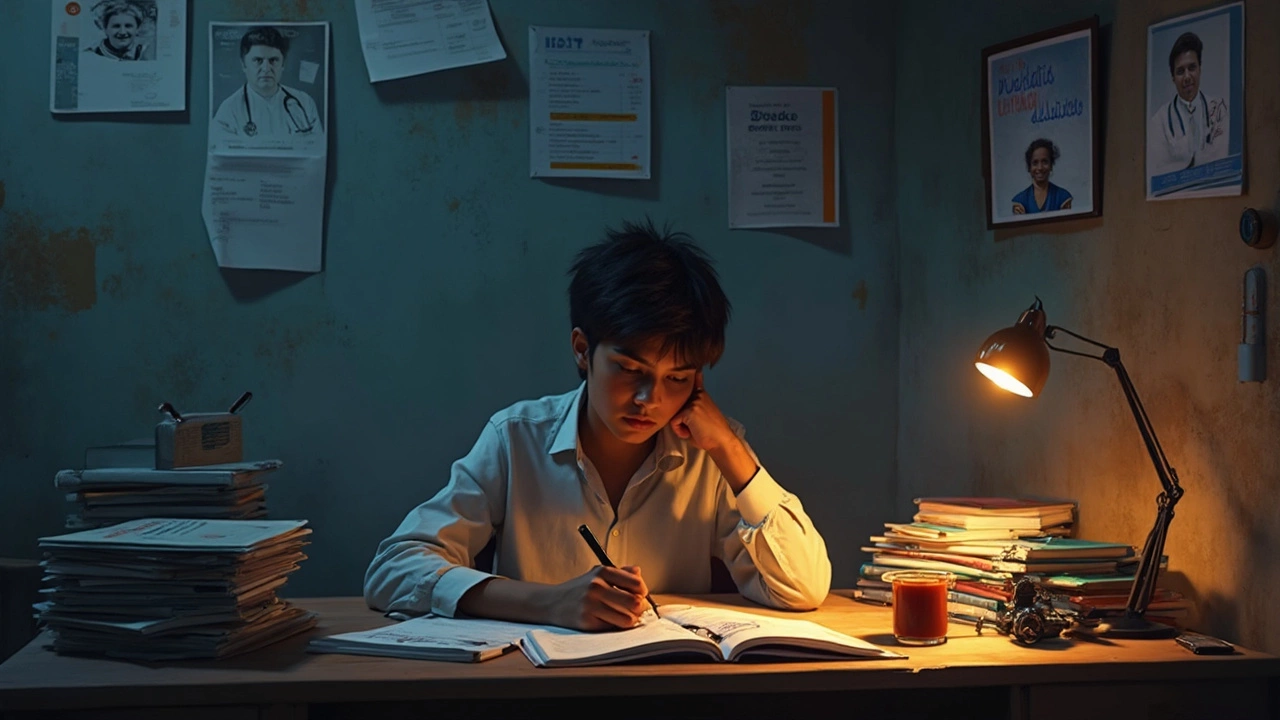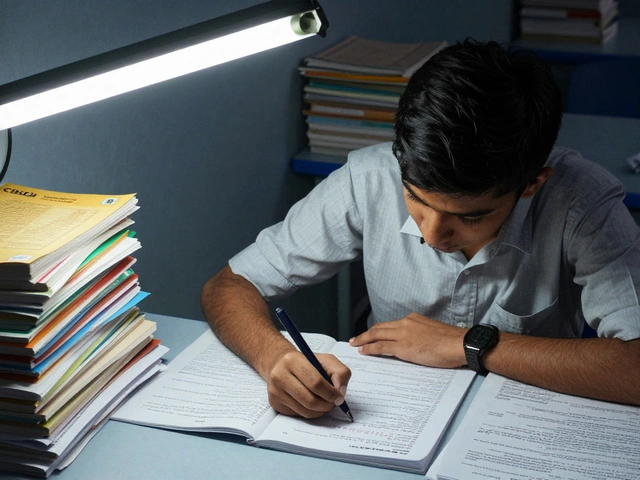Think NEET is just a grueling test you need to get past to become a doctor? Ask anyone who’s sweated through the hours locked in a silent hall—every year, students step out claiming, “This one was the hardest ever.” But is that really true? Which NEET exam truly wore the crown for being the toughest? The answer isn’t as straightforward as everyone hopes. There’s a year that stands out with its unique challenges, the kind that left both top teachers and toppers scratching their heads. Let’s get our hands dirty and piece together what made hardest NEET exam such a notorious title—beyond urban legends and rumors swirling across coaching institutes.
The NEET Timeline: Years Battling for "Toughest" Title
NEET first hit the scene in 2013, changing the way aspiring doctors chase their dreams across India. It unified what was a jumble of state and institution-level entrance exams into one behemoth test. Since then, competition has grown fiercer, with lakhs of students vying for those precious medical seats each year. But not every year’s NEET feels the same. What makes an exam hard? For some, it’s those bizarre biology MCQs; for others, the left-field chemistry or math-like physics. Over the years, three editions always pop up in campus debates: NEET 2016 (the post-AIPMT merger twist), NEET 2018 (a paper with wild cutoffs), and NEET 2020 (pandemic nerves). But ask anyone who dove into the data, and most agree: NEET 2018 takes the cake for being the hardest of them all. Even coaching giants like Allen and Aakash flagged 2018 as “exceptionally lengthy and concept-heavy,” especially in Physics.
To give you the full picture, here’s a quick breakdown comparing some NEET years with their number of test takers, reported student feedback, and cutoffs:
| Year | No. of Candidates | Reported Difficulty | Cutoff for UR (50th %ile) |
|---|---|---|---|
| 2016 | 7.3 lakhs | Moderate, tricky biology | 145/720 |
| 2018 | 13.2 lakhs | Very Tough, physics nightmares | 119/720 |
| 2020 | 13.7 lakhs | Difficult, pandemic stress | 147/720 |
| 2023 | 20.9 lakhs | Easy-moderate, high cutoffs | 137/720 |
Look at 2018. The cutoff barely touched 119, one of the lowest ever. Students across India complained about Physics in particular—lengthy calculations, unexpected concepts, time crunches, and even questions no coaching material had warned about. Some said, “Even if you knew the theory, you needed nerves of steel to finish on time.” Now, stack that against the previous and following years: tougher papers usually mean lower cutoffs because—let’s face it—everyone’s marks take a dip.
What Makes a NEET Exam ‘Hard’? Science, Psychology, and Preparation
So, what really makes a NEET paper tough? It’s not just the syllabus. The CBSE (earlier), then NTA, designs the paper so all three subjects—Biology, Chemistry, and Physics—feel balanced, but little changes tilt the scales. Here’s what students and teachers have actually noticed:
- Physics gone wild: When Physics MCQs demand three-step calculations for nearly every question, speed junkies and deep thinkers both drown. NEET 2018’s Physics had nearly 20 questions that students called ‘JEE-Main level’—unheard of until then.
- Blunt surprises in Biology: Biology usually feels like the scoring section. But in a few years, including 2016 and 2021, out-of-NCERT questions shocked even rankers. That’s when the murmurs of “unfair” start picking up.
- Chemistry shakeups: When Chemistry goes heavy on physical chemistry and practical applications, those who depend on rote learning get left behind. The classic NEET 2018 ‘thermodynamics’ questions? They’re still legendary.
- Time management crunch: Lengthy or wordy questions mean even bright minds run out of time. Stressed students panic, guesses multiply, and scores tumble.
- Cultural or regional biases: Sometimes, translation errors in regional papers or unfamiliar plant names trip up candidates.
Anytime at least one or two of these factors gang up, you see the student forum posts light up with “This was the hardest NEET ever.” But when you piece together every student rant, meme, and academic report, NEET 2018’s Physics still reigns as the all-time beast.

The Real Impact of a Tough Exam: Stories from NEET Survivors
It’s easy to talk numbers, but what do the toppers and regular survivors say? Listen to Arjun Goyal, who scored 680 in NEET 2018: “For Physics, I felt like I was preparing for JEE Advanced. I finished my last answer with two minutes on the clock—didn’t even double-check my OMR.” His batchmate Priya Nair, who’d consistently topped mock tests, shared, “My biology was always strong, but some names in the botany section were words I never studied. For two minutes, my mind went blank.” That’s the real bite of a ‘hard’ exam—it’s not about a couple of tough questions, it’s about the widespread panic even veterans feel.
What’s fascinating is the pattern: hard NEET years almost always produce stories of students who assumed they’d blown the exam, only to find out later that everyone struggled, so cutoffs dropped. It’s a weird quirk—facing a cruel paper actually levels the field. In 2018, candidates with scores just above 500 found their All India Ranks jump up way higher than earlier batches. There’s even a funny stat: Google searches for “NEET Physics outrage” and “how to file objection NEET exam” spiked highest that year. Sometimes, the pain gets so universal that it writes its own history.
One more odd effect? Coaching centers had to change their playbook. Since 2018, most big name institutes started adding tougher mock tests, more cross-NCERT questions, and time management drills. Alumni even recall ‘Disaster day mocks’—special mock exams meant to be harder than the actual NEET, just to prepare students for any storm.
Can You Prepare for the ‘Hardest’ NEET? Real Strategies That Work
So, how do you beat a NEET paper even when it decides to go full villain mode? Here are tips that worked for 2018’s survivors—and honestly, they’re the kind that can save your day in any year:
- Don’t underestimate Physics: You can’t just wing it with formulas. Practice calculation-heavy questions straight from past JEE Mains and Advanced. Build speed and stamina by timing yourself every single practice session.
- Master NCERT for Biology: Yes, people say this all the time. But survivors from the hardest years had their NCERTs almost shredded from repeated reads. Annotate them. Make your own summaries. For rare terms, use sticky notes and flashcards.
- Handle Chemistry conceptually: Don’t just memorize reactions—know why things happen. For tough physical chemistry problems, solve the same type again and again, then quiz yourself on the theory behind it.
- Time management is king: In a long or twisty NEET, finishing every question is a battle. Do five full-length mocks in a row on weekends. Use a stopwatch. In your first go, answer the easiest questions—mark the beasts for later, then come back if time allows.
- Mental fitness saves the day: Toppers swear by meditation, power naps, and short walks before mocks. Stress isn’t just a side effect—the better you handle pressure, the more clearly you’ll think when those curveball MCQs hit.
- Don’t rely on leaked paper rumors: Every year, chat groups explode with so-called leaks. Ignore them. Focus your brainpower on solid prep, not wild goose chases.
Survivors from 2018 tell the same story: the intense practice, handling setbacks in mocks, and never giving in to panic made all the difference. One more thing: don’t chase perfection—aim for accuracy and steady finishing. For the hardest NEETs, it’s not the toppers who score 700 who win, it’s those who stay cool and squeeze the extra 10 marks out that leap up the ranks.

Myths and Misconceptions: What Tough NEET Papers Teach Us
There’s always chatter that a hard NEET year is ‘unfair’ or that luck counts for everything. Not quite. A genuinely tough paper does level the game. Those who prepped honestly—across topics, not just last year’s trends—always find a way to push through. The legends of NEET 2018 show something surprisingly kind: if you’re finding it brutal, so is everyone else. The trick isn’t to panic, but to adapt fast during the three hours.
Another popular myth: If a year is terrible, coaching centers will have a secret set of predictions or leaks to rescue paying students. That’s a fantasy. In 2018, not a single mock or 'insider tip' nailed the Physics. The students who did well were the ones who rolled with the punches in the exam hall, not those who had secret batches or paid for expensive shortcuts.
Finally, don’t fall for the rumor that NEET alternates between hard and easy years. The truth is, setting one national paper for lakhs every year is a challenge for testers too. Some years they overshoot, some years they undershoot, but no one knows in advance. Study consistently, cover all bases, and don’t let social media noise mess with your focus.
If you ask teachers or students who survived the "toughest NEET ever," they'll agree: it's less about the year, more about the survivor mentality. Every ambitious doctor-in-the-making should plan for the worst, hope for the best, and keep revising until OMR sheets are almost muscle memory.







0 Comments